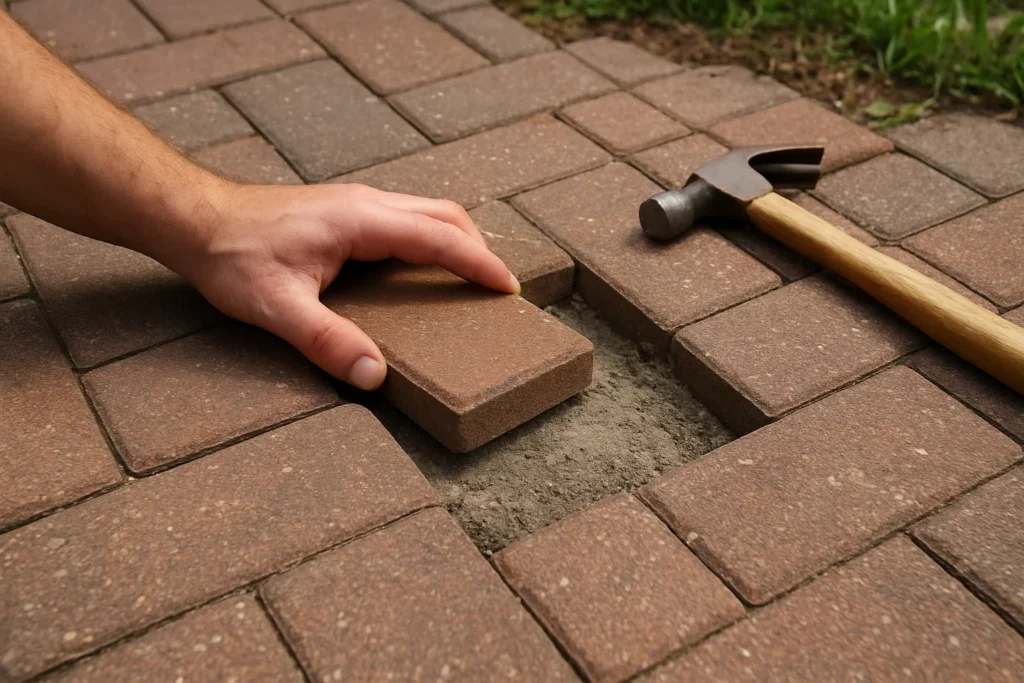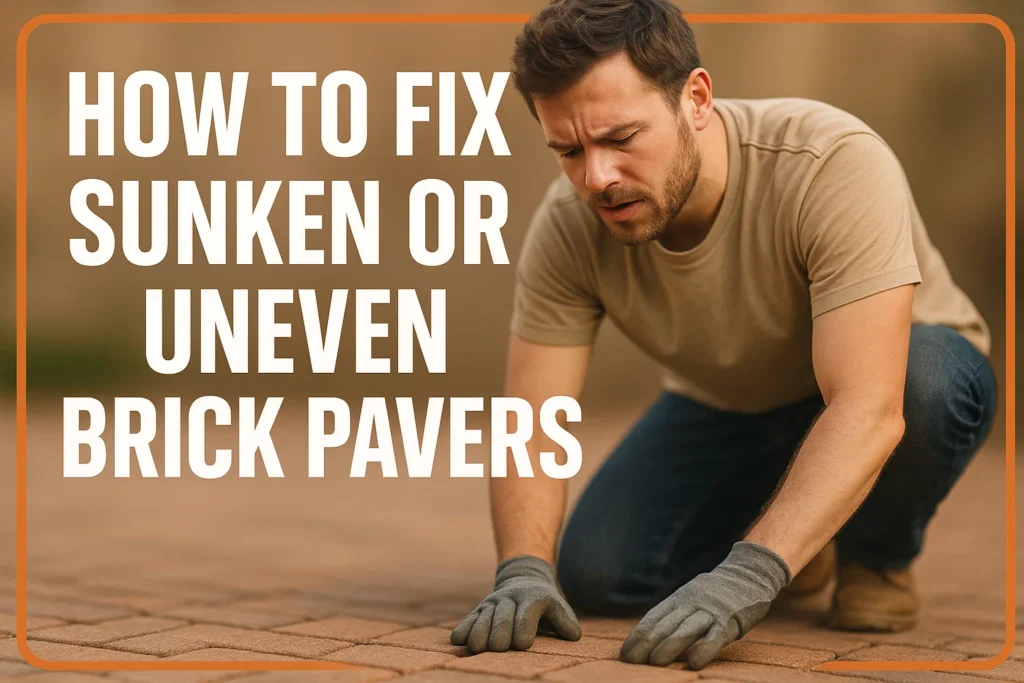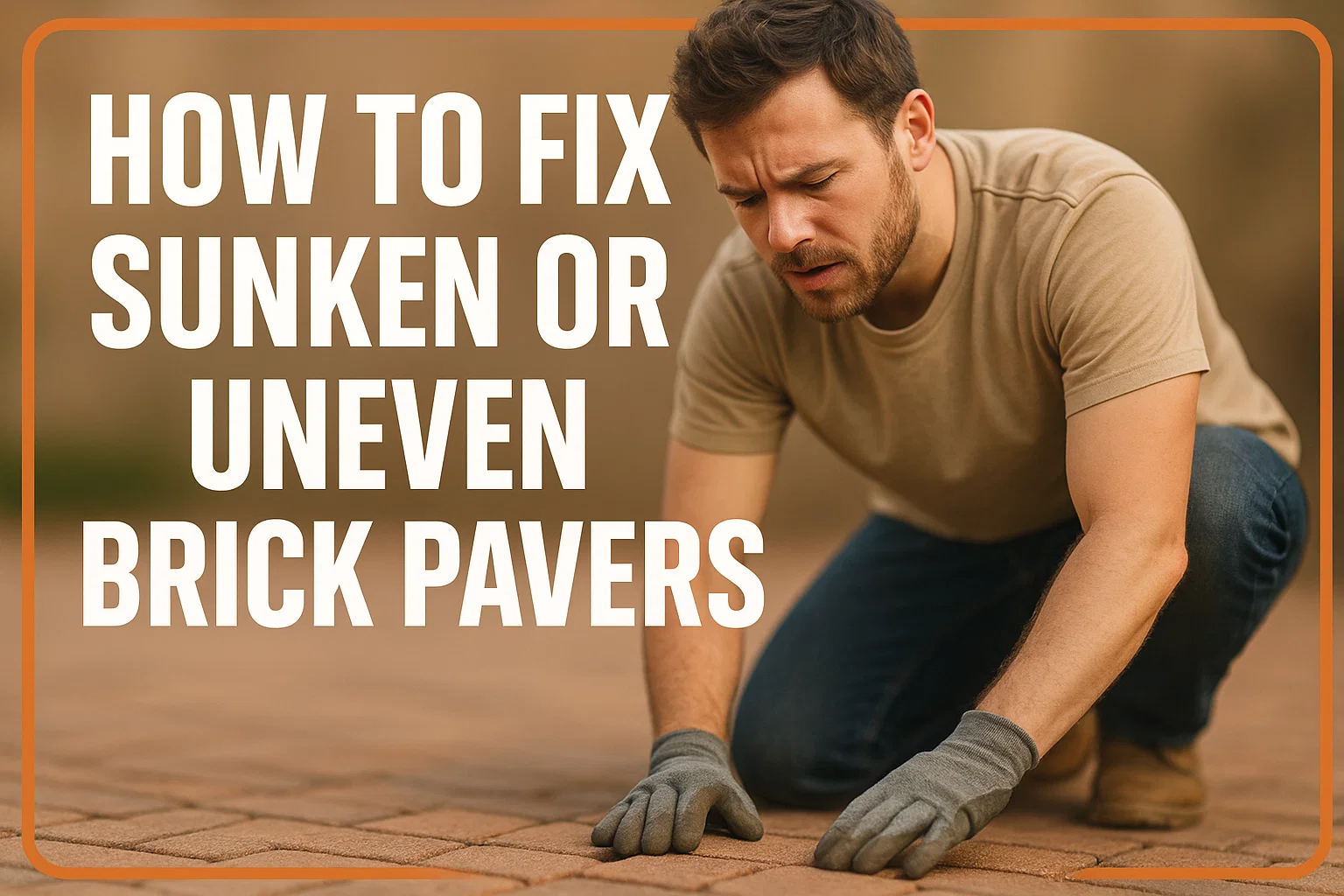The patios, walkways and driveways of the brick pavers are usually popular because they are durable and have a traditional appearance. Nevertheless, even the most properly prepared pavers may have problems in the long run, including sinking, shifting, or cracking. Such issues tend to arise due to weather variations, soil erosion or natural wear and tear.
Timely repairs and proper care can restore the original beauty of your brick pavers and make them safe and functional over the years. In this blog, you will learn how to fix the problems that are prevalent with brick pavers and how to repair sunken or uneven areas properly.
Why Do Pavers Sink or Become Uneven?
Pavers sink or become irregular mainly due to changes or issues under the surface.
Soil Settling: The Settlement of soil is one of the common reasons. Once put in place, the ground/soil beneath the pavers may sink or shift, particularly when the ground was not sufficiently compacted before laying the pavers. Pavers lose their stable support and sink or tilt down when the base material is allowed to settle.
Water Erosion: Another predominant factor is water. Rain or ineffective drainage may erode the underlying material beneath the pavers, leaving the pavers uneven. The foundation is weakened by standing water and erosion, resulting in sinking points.
Freeze-Thaw Cycles: Paver stability is also influenced by the process of freezing and thawing. As the water under the pavers freezes, it expands and lifts the pavers. Then, as it thaws, the ground pulls in, forming openings that make the pavers unevenly sink with time.
Heavy Loads: This is due to the heavy loads or traffic that may uniformly or disintegrate the base, leading to the movement of pavers as a result of weight. Any large tree root that is growing below a paved area raises the pavers or makes it uneven as roots develop and enlarge.
These reasons will enable you to keep the surface of your pavements durable and even, and solve the emerging issues easily.
How to Fix Different Types of Paver Issues

Repairing sunken or uneven brick pavers is not a difficult job when it is handled in the correct way. To recover your pavers into a level and stable surface, use these straightforward steps:
Step 1: Uneven or Sunken Pavers
Go around your paved surface and indicate all sunken or uneven areas. Pay attention to the areas that form the dips or tripping.
Step 2: Disappearing or Washed-Out Edges
A flat pry bar or screwdriver may be used to lift the affected pavers softly so that they are not damaged. Place the pavers you have removed on a clean surface.
Step 3: Falling or Loose Border Pavers
Sweep off all dirt and debris on the top and bottom of the removed pavers. Clean pavers are more comfortable to sit on and appear more presentable after reinstalling.
Step 4: Water Pooling on Paver Surface
Eliminate any loose or eroded undercarriage, sand and dirt under the removed paving.
Step 5: Pavers Shifting or Tipping
Then add a layer of base, which is 1-2 inches of crushed stone or gravel. Tamper the base material with a hand tamper or plate compactor to ensure the material is hardened to offer a solid foundation and avoid sinking in the future.
Step 6: Cracked or Broken Pavers
Thickly coat the pressed base with coarse sand 1 inch thick. Smooth it out using a straight edge or screed board to make a smooth bed.
Step 7: Replace the Pavers
The cleaned pavers should be relaid on the sand bed to form a level and a well-spaced bed.
Step 8: Fill the Joints
Polymeric sand or fine joint sand should be swept into the cracks between the pavers. Tamper and sweep the sand again to fill all the gaps.
Step 9: Water the Pavers
Spray a small amount of water on the pavers to make the polymeric sand work or to settle the joint sand. Do not overwater it because the sand would be washed away.
Cost to Repair Sunken or Uneven Pavers
The cost of repairing sunken or uneven pavers may differ greatly depending on the level of the damage and the method of repair. The average costs involved are as follows:
- Professional repair can range between $300 to 750 on a small and localized scope of roughly 50 square feet.
- The cost per square foot varies between $7 and 30 dollars and the majority of the homeowners pay between $726 and $2485 to get complete repairs of the houses.
- Most typical repair procedures are leveling sunken areas which cost approximately 6 to $15 per square foot and replacing individual pavers which usually cost $15 to $125 or more.
- Repairs or resurfacing, major, may cost between $600 and $3,000 and complete restoration of a driveway or patio may involve between $1,200 and $4,500.
| Repair Type | Cost Range |
| Small Repairs (cracks, joints) | $100 – $400 |
| Leveling Sunken Areas | $6 – $15 per sq.ft |
| Replacing Individual Pavers | $15 – $125+ per paver |
| Major Repairs or Resurfacing | $600 – $3,000 |
| Full Driveway Restoration | $1,200 – $4,500 |
Why Consider Professional Paver Repairs
It is a good idea to get someone to fix your pavers because it is economical in many ways. Professionals understand how to locate the actual source of the issue to ensure the fix will last longer and will not recur in the near future. They apply the correct tools and quality materials to ensure that the task is completed correctly and is presentable.
Professionals save time and effort and are fast at doing their jobs. Repairing pavements may be difficult, particularly when the site is extensive or has severe damage. By hiring a pro, you do not have to bother with doing it yourself or making mistakes.
You also make your outside look good and secure after good repairs. Even clean pavers will make your home look beautiful and be safe against trips and falls. Selecting professional repair is an excellent option to maintain your yard in the best possible way and to preserve your investment.
For more trusted or lasting services, you can rely on Maura Mason to ensure they are in great condition. Our lasting services include professional, trusted repair of pavements.
Conclusion
Finally, consider the best option by hiring a professional to do your paver repair, as this will guarantee long-lasting, safe and attractive outdoor surfaces. Small problems can be resolved independently, but when bigger or more complex issues arise, expert knowledge, tools, and experience are needed. Hiring a professional saves both time and effort and avoids problems in the future. It is also good in enhancing the appearance and value of your house by repairing a level and consistent paver.
FAQs
What do I do to know when my pavers require repair?
When you notice one or more sunken, uneven, cracked, or loose paving stones, then they need to be fixed.
Can I fix pavers myself?
Yes, you can fix minor repairs but major or complicated repairs need professionals.
Paver repair time: How long does it take?
Repairs are done in a matter of hours up to a couple of days based on the extent and nature of damage.





